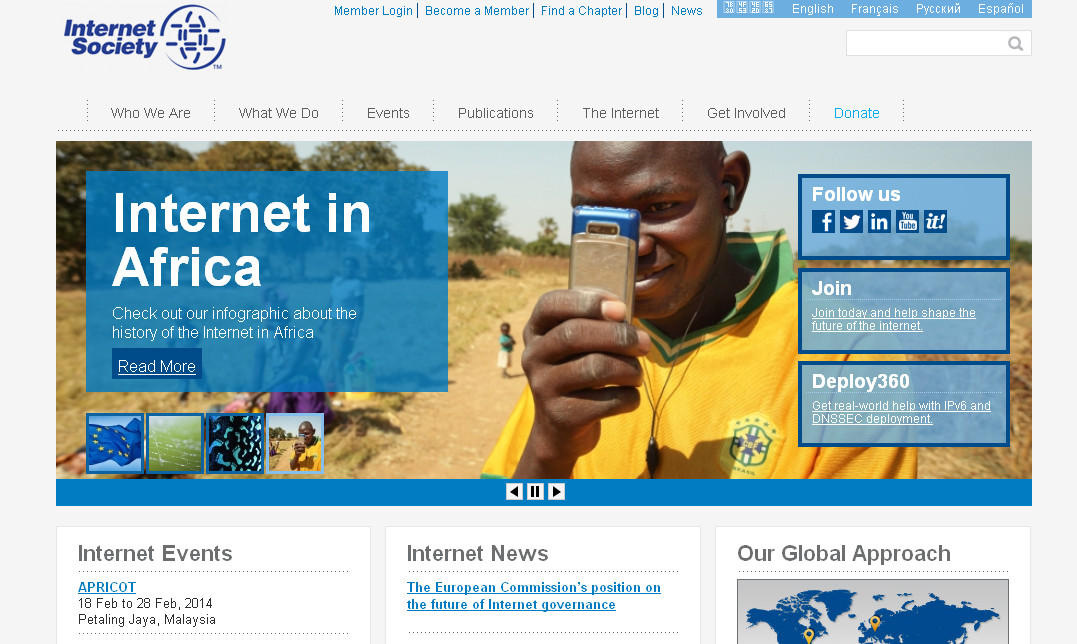Joint Internet Society and Universidad de San Andrés report demonstrates significant cost and performance gains from IXP development in Argentina, Brazil, Colombia, and Ecuador
Download the report
[Montevideo, Uruguay] – The Internet Society recently published the results of a study that demonstrates the far-reaching economic and societal benefits of establishing Internet Exchange Points (IXPs) in emerging markets. The study, commissioned by the Internet Society and conducted by Professor Hernan Galperin of the Universidad de San Andrés in Argentina, examined the critical cost and performance benefits of IXPs in Argentina, Brazil, Colombia and Ecuador – countries on the leading edge of Internet growth in Latin America.
 Analogous with the role that international airports play in airline traffic, IXPs serve as critical hubs for data traffic exchange in the global Internet infrastructure. Over 350 IXPs around the world enable local Internet Service Providers (ISPs) and Internet backbone carriers to efficiently and cost-effectively exchange Internet traffic. Many emerging markets do not have well-established IXPs, forcing domestic Internet traffic onto long-distance international links, resulting in significantly higher costs and quality of service challenges.
Analogous with the role that international airports play in airline traffic, IXPs serve as critical hubs for data traffic exchange in the global Internet infrastructure. Over 350 IXPs around the world enable local Internet Service Providers (ISPs) and Internet backbone carriers to efficiently and cost-effectively exchange Internet traffic. Many emerging markets do not have well-established IXPs, forcing domestic Internet traffic onto long-distance international links, resulting in significantly higher costs and quality of service challenges.
This new study identifies the positive impact that IXPs have made, including reduced telecommunications costs, faster and better local data exchange, and local technical capacity development. For example:
- To date, nine IXPs are operational in Argentina as part of the Cabase system that was created in 1998, connecting over 80 network operators. Internet transit costs have been reduced from USD $500 per Mbps per month in one city to about USD $40 per Mbps per month. Service providers have been able to expand their networks and quality of service.
- In 2004, the Comitê Gestor da Internet (CGI) launched an initiative called PTT Metro to create IXPs across Brazil, starting with their first IXP in São Paulo. As of April 2013, there were 22 IXPs in operation, covering 16 of Brazil’s 26 states. On aggregate, the IXPs associated with the PTT Metro initiative are exchanging over 170Gbps at peak hours, and providing better and faster connectivity to regions of Brazil that had poor Internet service.
- In Ecuador, international transit costs hover around USD $100 per Mbps per month. Local traffic can be exchanged at the IXP in Quito (NAP.EC) for as little as USD $1 per Mbps per month. Without an IXP, operators would exchange local traffic through international transit routes and the additional wholesale costs for local ISPs would be USD $7.2 million per year.
- The Colombian exchange point, NAP Colombia, started in 2000 in response to frequent disruptions in the domestic backhaul network and international links. By exchanging traffic locally, and later by installing content caches at the IXP, local ISPs were able to reduce their dependence on international routes, thus reducing costs and, most importantly, increasing service reliability.
“This study highlights the critical role that IXPs are playing in Latin America – from human capacity and network development to better quality of service and increased uptake of services,” said Sebastian Bellagamba, Regional Bureau Director for Latin America and the Caribbean at the Internet Society. “Offering more than just cost and performance benefits, well-run IXPs serve as a catalyst to dramatically enrich a country’s Internet ecosystem, opening a new world of possibilities with comparably minimal investment. We appreciate the collaboration with Professor Galperin and hope that this study will help inform the dialogue among government, business, and technology leaders of emerging countries to show them the benefits that IXPs can provide for developing partnerships for Internet growth in the region.”
Lead author of the study Hernan Galperin stated, “This report shows the important role that IXPs have played in the development of the Internet in Latin America. This role is likely to become more important as countries in the region address existing challenges such as network security, the improvement in the quality of services, and the reduction in access prices.”
The study was conducted as part of the Internet Society’s Internet Traffic Exchange Programme. This programme aims to foster robust, efficient, and cost-effective Internet interconnection environments in emerging economies, and furthers the Internet Society’s overall mission to promote the open development, evolution, and use of the Internet for the benefit of all people throughout the world.
Download the full study in:
Funding for this study was provided in part by Google under the IXP Toolkit Best Practices Grant Project.
About the Internet Society
The Internet Society is the trusted independent source for Internet information and thought leadership from around the world. With its principled vision and substantial technological foundation, the Internet Society promotes open dialogue on Internet policy, technology, and future development among users, companies, governments, and other organizations. Working with its members and Chapters around the world, the Internet Society enables the continued evolution and growth of the Internet for everyone. For more information, visit www.internetsociety.org.
Media contact: Wende Cover, cover@isoc.org, +1-703-439-2773









